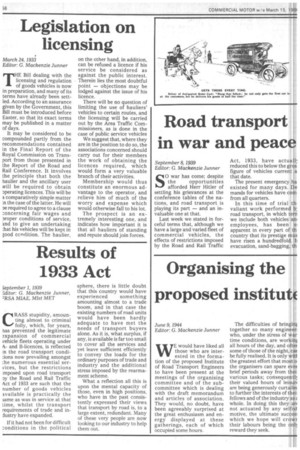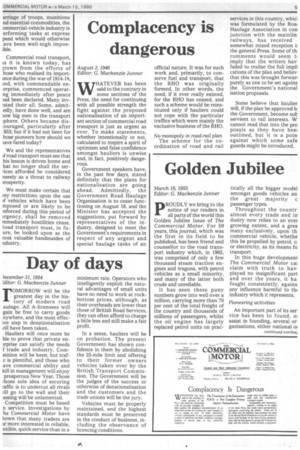Road transport in war and peace
Page 58

Page 59

If you've noticed an error in this article please click here to report it so we can fix it.
September, 8, 1939 Editor: G. Mackenzie Junner SO war has come; despite the opportunities afforded Herr Hitler of settling his grievances at the conference tables of the nations, and road transport is playing its part — and an invaluable one at that.
Last week we stated in forceful terms that, although we have a large and varied fleet of commercial vehicles, the effects of restrictions imposed by the Road and Rail Traffic Act, 1933, have actual!: reduced this to below the gros figure of vehicles current a that date.
The present emergency ha existed for many days. De mands for vehicles have corn from all quarters.
In this time of trial th valiant work performed 13: road transport, in which tern we include both vehicles an employees, has been si apparent in every part of th country that its prestige mus have risen a hundredfold. evacuation, sand-bagging, th aniage of troops, munitions nd essential commodities, the ommercial-vehicle industry is erforming tasks at express peed which would otherwise .ave been well-nigh imposible.
Commercial road transport, is it is known today, has ;Town from the efforts of hose who realised its importince during the war of 1914-18, Ind, with commendable enerprise, commenced operatng immediately after peace iad been declared. Many inv,sted their all. Some, admitedly, have done well, and are low big men in the transport ;phere. Others became dis:ouraged, particularly after 933; but if it had not been for hose pioneers how should we lave fared today?
We and the representatives if road transport must see that his lesson is driven home and hat no longer shall the serices afforded be considered nerely as a threat to railway irosperity.
We must make certain that my restrictions upon the use )f vehicles which have been mposed or are likely to be !nforced during this period of irgency, shall be removed mmediately hostilities cease. toad transport must, in fuure, be looked upon as the cost valuable handmaiden of adustry.
































































































































